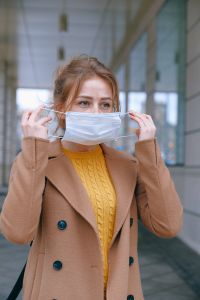 Over the last few weeks there has been significant media attention to the longer-term effects of Covid infections, as time progresses there is a greater understanding of the illness and its effects on both body and mind. A recently released Italian study has found that 50% of hospitalised survivors of Covid-19 have significantly worse mental health than before their illness. The people surveyed reported that they were struggling with anxiety, depression, insomnia and PTSD after their bout of illness.
Over the last few weeks there has been significant media attention to the longer-term effects of Covid infections, as time progresses there is a greater understanding of the illness and its effects on both body and mind. A recently released Italian study has found that 50% of hospitalised survivors of Covid-19 have significantly worse mental health than before their illness. The people surveyed reported that they were struggling with anxiety, depression, insomnia and PTSD after their bout of illness.
The researchers have theorised that some of this effect can be explained by the levels of inflammation that occur in the body while it’s fighting off the viral illness. Women are less likely to die from Covid-19 than men but this study found they are more at-risk of suffering from anxiety and depression after they recover. “Psychiatric effects could be caused by the immune response to the virus itself, or by psychological stressors such as social isolation, psychological impact of a novel severe and potentially fatal illness, concerns about infecting others, and stigma” said the researchers.
The results underscore growing concerns about potential debilitating health complications for survivors of the disease. While effective treatments for anxiety, depression and PTSD exist, it’s known that many with these conditions delay seeking help. There are some concerns that people with mental health difficulties post-covid may delay seeking treatment even longer than usual due to a perceived lack of capacity in NHS mental health services.
While the mental health struggles are triggered by inflammation, there is evidence that talking therapies such a Cognitive Behavioural Therapy and Clinical Hypnotherapy may be effective.
With over 2000 highly trained and qualified therapists across the UK, the National Council for Hypnotherapy is well placed to deal with PTSD problems and other issues like stress, anxiety and phobias which could result from post-Covid complications.
“Clinical hypnotherapy has a proven record in treating anxiety, stress, PTSD and other similar issues” says the NCH.
During hypnotherapy sessions, sufferers can learn to come to terms with their trauma and gain a sense of control over their fears and anxieties. By focusing on realistic thoughts, they can avoid falling back into negative thinking patterns whenever they encounter a trigger.
If you’re struggling with your mental health after a covid infection, use the NCH directory, to find a therapist near you.
